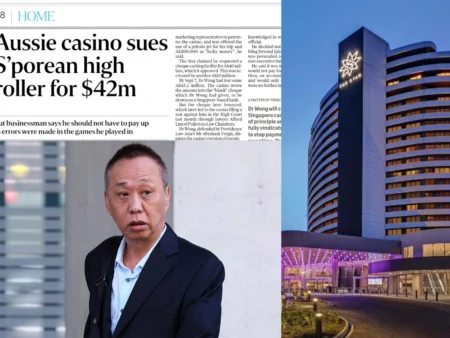
A recent report from the Singapore government, jointly issued by the Ministry of Home Affairs, the Ministry of Law, and the Monetary Authority of Singapore, identifies a ‘moderate’ risk of money laundering in the city’s land-based casinos. Despite their cash-rich nature, these establishments have limited appeal for money launderers compared to online gambling platforms.
Land-Based Casinos and Money Laundering Vulnerability
While no direct evidence implicates Singapore’s land-based casinos in illegal activities, their significant cash flow makes them potential targets for money laundering criminal proceeds. The report notes that casinos like Marina Bay Sands and Resorts World Sentosa are less attractive for money laundering due to their limited transnational reach and lack of alternative payment methods like cryptocurrencies.
The Gambling Regulatory Authority (GRA), responsible for overseeing casino activities in Singapore, reported few instances of suspicious transactions related to money laundering. Most of these cases involved regulatory breaches rather than direct attempts to launder money. One significant case involved a programmer who used $1.9 million in illicit commissions to buy casino chips, gambling some and cashing out the rest to pay personal expenses.
Online Gambling: A Greater Money Laundering Threat
The report contrasts the moderate risk in land-based casinos with the higher risks associated with online gambling. Recent raids revealed large-scale money laundering schemes involving illegal online gambling platforms based in the Philippines.
This report comes as part of broader efforts by Singaporean authorities to combat financial crimes. The government has been enhancing its Anti-Money Laundering/Countering Financing Terrorism (AML/CFT) framework through strict supervision, enforcement, and international cooperation.
In early June, Singapore police conducted extensive raids on an organization involved in illegal online gambling and money laundering. The operation led to the arrest of ten foreigners and the seizure of assets worth S$1 billion ($738.9 million), with S$944 million ($697.5 million) confiscated by state authorities. Among those arrested was a 36-year-old Vanuatu citizen, identified as S.J., who was sentenced to seventeen months in jail for forgery and money laundering.
These operations underscore the challenges law enforcement faces in tackling money laundering, particularly in the more lucrative online gambling sector. Investigations continue into additional suspects located outside Singapore.










